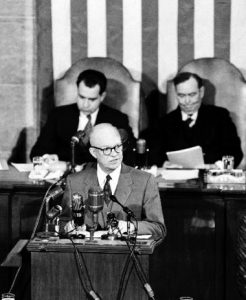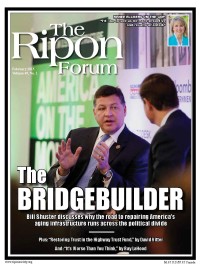 On Feb. 22, 1955, President Dwight D. Eisenhower appeared before a Joint Session of Congress and laid out his vision to build America’s interstate highway system.
On Feb. 22, 1955, President Dwight D. Eisenhower appeared before a Joint Session of Congress and laid out his vision to build America’s interstate highway system.
“The highway system is a public enterprise,” he stated matter of factly. “As the owner and operator, the various levels of Government have a responsibility for management that promotes the economy of the nation and properly serves the individual user.”
Sixty years later, the system that Eisenhower built stands in a state of disrepair. Roads are unsafe. Bridges are crumbling. And the Highway Trust Fund that was intended to pay for new construction is instead hemorrhaging money and in need of a new, long-term infusion of cash.
In response to this crisis, Congress and the President have punted. Twenty seven times over the past five years, they have passed short-term funding bills that have slowed the deterioration of our aging infrastructure but have done nothing to rebuild it or keep it from getting worse. The last of these short-term measures was approved last summer and expires in May.
With the clock ticking and funds running out, this latest edition of The Ripon Forum looks at the prospects that Congress will be able to reach agreement on a long-term spending plan before the deadline is reached. We do so by talking with and hearing from a collection of leaders and experts who are helping to drive the debate.
Leading our coverage is an interview with Bill Shuster, the Chairman of Transportation & Infrastructure Committee. Shuster’s job is to steer the bill through the House. Both literally and politically, Shuster is a bridgebuilder – someone who understands that the road to repairing America’s aging infrastructure runs across the partisan divide. In our interview, he talks about the challenge of passing a bill, and the importance of taking action this year.
We also hear from Senator David Vitter, who Chairs the Subcommittee on Environment and Public Works and shares Shuster’s sense of urgency about the importance of reaching agreement on a long-term plan. “While short-term fixes have allowed the trust fund to continue operating,” the Louisiana lawmaker writes, “taxpayers continue to drive on deteriorating roads and bridges wondering where their taxpayer dollars have gone.”
This viewpoint is echoed by Ray LaHood. In an essay for the Forum, the former Congressman and Transportation Secretary writes about the “deplorable state” of America’s infrastructure and what it is costing American taxpayers each year. “Because 32 percent of major roads are in poor or mediocre condition,” he pens, “taxpayers are paying on average $444 each year in additional vehicle repairs and operating costs … And because 44 percent of America’s major urban highways are congested, drivers are paying $121 billion in wasted time and fuel.”
This edition of the Forum also looks at the possibility of adopting a mileage-based user fee as a new source of revenue for the Highway Trust Fund. Adrian Moore of the Reason Foundation argues it is something that should be seriously considered, while Gary Biller with the National Motorists Association argues that the costs may be too high. And, in two other insightful essays, Jonathan Gifford of George Mason University examines the growing importance of Public-Private Partnerships, and Joshua Schank of the Eno Center for Transportation examines our nation’s transportation priorities and concludes that they need to be changed.
As always, we hope you find this edition of The Ripon Forum informative and interesting, and encourage you to contact us with any comments or questions you may have.
Lou Zickar
Editor of THE RIPON FORUM
louzickar@clu.ccw.mybluehost.me




